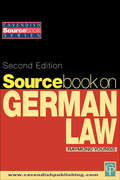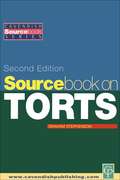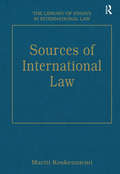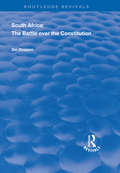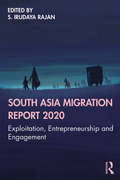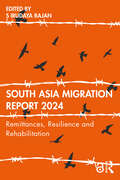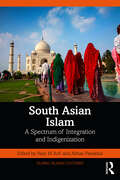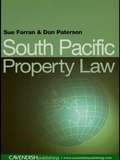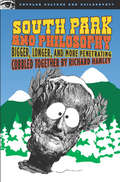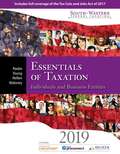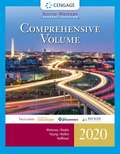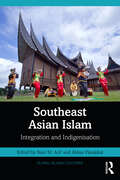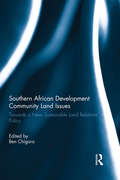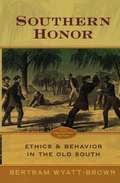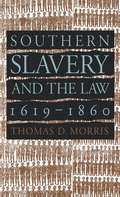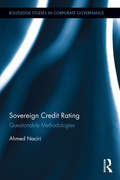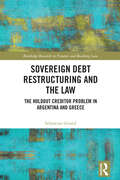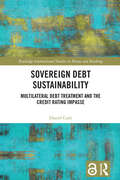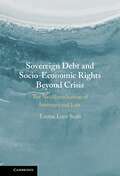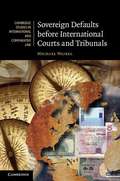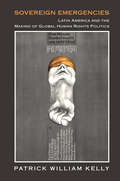- Table View
- List View
Sourcebook on German Law (2nd Edition)
by Raymond YoungsThe purpose of this book is to give the reader a selective outline of significant parts of the central areas of German substantive law, along with original German legal material from these areas.
Sourcebook on Tort Law 2/e (Sourcebook Series)
by Graham StephensonThe purpose of this book is to provide a clear guide to tort law, examining the main principles and areas of the subject. It includes text emphasizing the main issues of liability. The text incorporates relevant materials, extracts from leading judgments, articles and reports of review bodies on tort law. It should prove especially useful for those who do not have access to a law library, as for those whose library is under severe pressure from users. It will be useful to those participating in seminars and tutorials and will enable them to take part in a good level of discussion. This new edition of Sourcebook on Torts has been fully revised and incorporates the Human Rights Act 1998. The effect of the European Courts decision in Osman is now being felt, as is evident from the judgments of the House of Lords in Barrett v Enfield BC. The Law Commission's proposals on liability for psychiatric illness are included. Developments in the tort of nuisance, the defence of qualified privilege and damages are also scrutinized. Several Law Commission reports and the Social Security (Recovery of Benefits) Act 1997 are also extracted, as are other new pieces of legislation, such as the Damages Act 1996 and the Defamation Act 1996.
Sources of International Law (The\library Of Essays In International Law Ser. #5)
by Martti KoskenniemiA collection of essays on the various aspects of the legal sources of international law, including theories of the origin of international law, explanation of its binding force, normative hierarchies and the relation of international law and politics.
South Africa: The Battle over the Constitution (Routledge Revivals #4)
by Siri GloppenOriginally published in 1997, South Africa: The Battle over the Constitution analyses rivaling positions in the South African constitutional debate from the early 1990s, via the 1993 interim constitution to the adoption and certification of the new, 'Final' Constitution in December 1996. A theoretical framework is developed to analyze the constitutional structure of the contesting constitutional models and the book looks into their potential for addressing the problems of violence, social inequality and ethnic tension and for achieving legitimacy and constitutionalism. It argues that the constitutional 'solutions' are premised on incomparable conceptions of South African reality, and that the Final Constitution includes elements based on incompatible world-views. The compromises required by the 'constitutional moment' could pose problems for the ’constitutional function’. The book also discusses other factors influencing the consolidation of a constitutional democracy in South Africa, such as the role of the Constitutional Court and the attempts to create legitimacy for the constitution by broad public participation in the constitution-making process.
South Asia Migration Report 2020: Exploitation, Entrepreneurship and Engagement
by S. Irudaya RajanSouth Asia Migration Report 2020 documents key themes of exploitation and entrepreneurship of migrants from the region. This volume: • Includes dedicated fieldwork from India, Pakistan, Bangladesh and Nepal; • Analyses the impact of South-Asia-migrant-established businesses; • Examines legal and legislative recourse against exploitation in destination countries; • Factors in how migration as a phenomenon negotiates with gender, environment and even healthcare. This book will be indispensable for scholars and researchers of economics, development studies, migration and diaspora studies, gender studies, labour studies and sociology. It will also be useful to policymakers, think tanks and government institutions working in the area.
South Asia Migration Report 2024: Remittances, Resilience and Rehabilitation
by S Irudaya RajanSouth Asia Migration Report 2024 documents key themes of remittances, resilience, and rehabilitation from the region.This volume: • Includes dedicated fieldwork to map migration within and outside South Asia;• Analyses the impact of Covid-19 on migrants and migration in South Asia;• Highlights the plight of Afghan migrants post-Taliban takeover in the country. This book will be indispensable for scholars and researchers of economics, development studies, migration and diaspora studies, gender studies, labour studies and sociology. It will also be useful to policymakers, think tanks and government institutions working in the area.
South Asian Islam: A Spectrum of Integration and Indigenization (Global Islamic Cultures)
by Nasr M Arif Abbas PanakkalThis volume explores the historical trajectory of the spread of Islam in South Asia and how the engagements of the past have played a crucial role in the making of the present outfits of South Asian Islam. Islam in South Asia has maintained a distinct role while imbibing cultural, social, ethnic, folk, and artistic networks of the subcontinent in diverse echelons. In an unequivocal analysis, this volume showcases the visible varieties of Islam from an array of regional cultural, ethnic, and vernacular groups. While many characteristics remain distinct in different provinces or regions of South Asia, similarities are palpable in etiquettes, customary laws, art, and architecture. More than regional differences, various ethnic groups from all poles of the Indian subcontinent have paved the way for the dissimilar landscapes of Islam, in tandem with differences in language, culture, and festivals. The case studies in this book exhibit forms of cultural pluralism in the communities, which have helped in building a cohesive community. Part of the ‘Global Islamic Cultures’ series that looks at integrated and indigenized Islam, this book will be of interest to students and researchers of religion, religious history, theology, study of Islamic law and politics, cultural studies, and South Asian Studies. It will also be useful to general readers who are interested in world religions and cultures.
South Carolina Driver’s Manual
by South Carolina Department of Motor VehiclesSouth Carolina Driver’s Manual
South Pacific Contract Law
by Jennifer Corrin-CareThis book presents the general principles of contract law that apply in the countries of the University of the South Pacific ('USP') region - Cook Islands, Fiji Islands, Kiribati, Marshall Islands, Nauru, Niue, Tokelau, Tonga, Tuvalu, Samoa, Solomon Islands, and Vanuatu. It is unique in that it provides the only up-to-date survey of regional authorities for the principles of contract operating within the region. Like many other branches of the law, contract law has yet to establish its own identity in the South Pacific. However, whilst it is still based on the law of England, there are significant differences between English contract law and South Pacific contract law. The text provides a clear explanation of this divergence and highlights regional innovations, both in the form of legislation and local case law. It also examines the role of customary law and provides a comprehensive study of the significant differences between the law of contract in individual regional countries. Comparison is made between regional law with current English contract law, and with the contract law of Australia and New Zealand, particularly where regional courts have preferred that law to the law of England. This book is essential reading for all students of contract law in the South Pacific and constitutes a very useful source book and guide for academics and practitioners, from within and outside the region.
South Pacific Property Law
by Sue Farran Donald PatersonFirst published in 2004. Routledge is an imprint of Taylor & Francis, an informa company.
South Park and Philosophy
by Richard HanleyTrey Parker and Matt Stone's long-running Comedy Central hit cartoon South Park has been equally cheered and reviled for its edgy humor, poited satire of current events and celebrities, and all-around obnoxiousness. But is there more to Kyle, the lonely Jew, Timmy and the Crips, Cartman's bitchiness, Chef's inappropriate advice, and Kenny's continued violent deaths than meets the eye? This collection of essays affirms that possibility. Individual chapters take a sometimes witty, often provocative look at "Is South Park a Libertarian Manifesto?", "That's So Gay!", and "Why Is Cartman Such an Asshole?". The writers apply classical philosophical analysis to this two-dimensional dystopia, whether in Paul Draper's "Why Good Things Happen to Bad People - The Problem of Evil in South Park" or Randall Auxier's "Finding South Park on the Map: Officer Barbrady, Mayor McDaniel, and Chef in Plato's Republic." South Park and Philosophy presents new and thoughtful approaches to understanding this surprisingly meaningful show.
South-Western Federal Taxation 2019: Essentials of Taxation: Individuals and Business Entities
by James Young William Raabe Annette Nellen David MaloneyMaster today's most important tax concepts and gain an understanding of the most current tax legislation with SOUTH-WESTERN FEDERAL TAXATION 2019: ESSENTIALS OF TAXATION: INDIVIDUALS AND BUSINESS ENTITIES, 22E. This brief edition's market-leading presentation helps you thoroughly grasp key taxation concepts and applications. You'll find the latest tax legislation at the time of publication, including the Tax Cuts and Jobs Act of 2017. Learning features, such as "Big Picture" examples, tax scenarios and "What If?" cases, clarify concepts and sharpen your critical-thinking, writing skills, and online research skills.
South-Western Federal Taxation 2020: Comprehensive Volume
by William Hoffman James Young William Raabe Annette Nellen David MaloneyMaster today's tax concepts and gain a thorough understanding of current tax legislation with Maloney/Raabe/Young/Nellen/Hoffman's SOUTH-WESTERN FEDERAL TAXATION 2020: COMPREHENSIVE VOLUME, 43E. This complete, understandable book provides today's most effective solution for understanding individual taxation, C corporations, taxes on financial statements and flow-through entities. Updated coverage details the latest tax legislation for both individual taxpayers and corporations, as of the time of publication, including tax reforms of 2018 and the Tax Cuts and Jobs Act of 2017. Engaging learning features, such as Big Picture examples, memorable tax scenarios and What If? case variations help clarify concepts. These features also strengthen critical-thinking, writing and online research skills that are key to your success as a tax practitioner.
Southeast Asian Islam: Integration and Indigenisation (Global Islamic Cultures)
by Abbas Panakkal Nasr M. ArifThis book explores Muslim communities in Southeast Asia and the integration of Islamic culture with the diverse ethnic cultures of the region, offering a look at the practice of cultural and religious coexistence in various realms.The volume traces the origins and processes of adoption, transmission, and adaptation of Islam by diverse ethnic communities such as the Malay, Acehnese, Javanese, Sundanese, the Bugis, Batak, Betawi, and Madurese communities, among others. It examines the integration of Islam within local politics, cultural networks, law, rituals, education, art, and architecture, which engendered unique regional Muslim identities.Additionally, the book illuminates distinctive examples of cultural pluralism, cosmopolitanism, and syncretism that persisted in Islamic religious practices in the region owing to its maritime economy and reputation as a marketplace for goods, languages, cultures, and ideas.As part of the Global Islamic Cultures series that investigates integrated and indigenized Islam, this book will be of interest to students and researchers of theology and religion, Islamic studies, religious history, political Islam, cultural studies, and Southeast Asian studies. It also offers an engaging read for general audiences interested in world religions and cultures.
Southern African Development Community Land Issues: Towards a New Sustainable Land Relations Policy
by Ben ChigaraThis book constitutes volume one of a two volume examination of development community land issues in Southern Africa. In this volume, Ben Chigara undertakes a holistic inter-disciplinary evaluation of the legitimacy of colonial and emergent post-colonial rule property rights in affected States of the Southern African Development Community (SADC). It particularly focuses on intensifying litigation in national courts, the SADC Tribunal, and more recently the Washington based International Centre for the Settlement of Investment Disputes (ICSID) regarding counter claims to title to property. The book examines cultural, economic and political drivers at the core of SADC land issues, focusing on their significance and potential to contribute to the discovery of a new, sustainable land relations policy that guarantees social justice in the distribution of all the advantages and disadvantages relating to the allocation and use of land. Chigara shows that persistent systematic administrative failures by pre-colonial, colonial and post-colonial authorities have made for a very complex challenge that requires Solomonic tools that neither the Courts alone, nor human rights centric morality alone could resolutely attend. The book recommends a sophisticated systematic new approach to SADC land issues, which is developed in volume two, Re-conceiving Property Rights in the New Millennium. This book will be of great interest to students and researchers of Property and Conveyancing Law, Human Rights Law and Land Law.
Southern Honor: Ethics and Behavior in the Old South (Revised)
by Bertram Wyatt-BrownSouthern Honor revolutionized our understanding of the antebellum South, revealing how Southern men adopted an ancient honor code that shaped their society from top to bottom. Using legal documents, letters, diaries, and newspaper columns, Wyatt-Brown offers fascinating examples to illuminate the dynamics of Southern life throughout the antebellum period. He describes how Southern whites, living chiefly in small, rural, agrarian surroundings, in which everyone knew everyone else, established the local hierarchy of kinfolk and neighbors according to their individual and familial reputation. By claiming honor and dreading shame, they controlled their slaves, ruled their households, established the social rankings of themselves, kinfolk, and neighbors, and responded ferociously against perceived threats. The shamed and shameless sometimes suffered grievously for defying community norms. Wyatt-Brown further explains how a Southern elite refined the ethic. Learning, gentlemanly behavior, and deliberate rather than reckless resort to arms softened the cruder form, which the author calls "primal honor." In either case, honor required men to demonstrate their prowess and engage in fierce defense of individual, family, community, and regional reputation by duel, physical encounter, or war. Subordination of African-Americans was uppermost in this Southern ethic. Any threat, whether from the slaves themselves or from outside agitation, had to be met forcefully. Slavery was the root cause of the Civil War, but, according to Wyatt-Brown, honor pulled the trigger.
Southern Man: A Novel (Penn Cage #7)
by Greg IlesAn instant New York Times bestseller!“Greg Iles is one of America’s great storytellers." –Stephen King, #1 New York Times bestselling author"A first-rate political thriller."–John Grisham, #1 New York Times bestselling authorThe hugely anticipated new Penn Cage novel from the #1 New York Times bestselling author of the Natchez Burning trilogy and Cemetery Road, about a man—and a town—rocked by anarchy and tragedy, but unbowed in the fight to save those they loveFifteen years after the events of the Natchez Burning trilogy, Penn Cage is alone. Nearly all his loved ones are dead, his old allies gone, and he carries a mortal secret that separates him from the world. But Penn’s exile comes to an end when a brawl at a Mississippi rap festival triggers a bloody mass shooting—one that nearly takes the life of his daughter Annie.As the stunned cities of Natchez and Bienville reel, antebellum plantation homes continue to burn and the deadly attacks are claimed by a Black radical group as historic acts of justice. Panic sweeps through the tourist communities, driving them inexorably toward a race war.But what might have been only a regional sideshow of the 2024 Presidential election explodes into national prominence, thanks to the stunning ascent of Robert E. Lee White, a Southern war hero who seizes the public imagination as a third-party candidate. Dubbed “the Tik-Tok Man,” and funded by an eccentric Mississippi billionaire, Bobby White rides the glory of his Special Forces record to an unprecedented run at the White House—one unseen since the campaign of H. Ross Perot.To triumph over the national party machines, Bobby evolves a plan of unimaginable daring. One fateful autumn weekend, with White set to declare his candidacy in all fifty states, the forces polarizing America line up against one another: Black vs. white, states vs. the federal government, democracy vs. Fascism. Teaming with his fearless daughter (now a civil rights lawyer) and a former Black Panther who spent most of his life in Parchman Prison, Penn tears into Bobby White’s pursuit of the Presidency and ultimately risks a second Civil War to try to expose its motivation to the world, before the America of our Constitution slides into the abyss.In Southern Man, Greg Iles returns to the riveting style and historic depth that made the Natchez Burning trilogy a searing masterpiece and hurls the narrative fifteen years forward into our current moment—where America itself teeters on the brink of anarchy.
Southern Slavery and the Law, 1619-1860
by Thomas D. MorrisThis volume is the first comprehensive history of the evolving relationship between American slavery and the law from colonial times to the Civil War. As Thomas Morris clearly shows, racial slavery came to the English colonies as an institution without strict legal definitions or guidelines. Specifically, he demonstrates that there was no coherent body of law that dealt solely with slaves. Instead, more general legal rules concerning inheritance, mortgages, and transfers of property coexisted with laws pertaining only to slaves. According to Morris, southern lawmakers and judges struggled to reconcile a social order based on slavery with existing English common law (or, in Louisiana, with continental civil law.) Because much was left to local interpretation, laws varied between and even within states. In addition, legal doctrine often differed from local practice. And, as Morris reveals, in the decades leading up to the Civil War, tensions mounted between the legal culture of racial slavery and the competing demands of capitalism and evangelical Christianity.
Souveräne Gleichheit und Dekolonialisierung: Der Kongo und die Vereinten Nationen
by Bent BöltenerIn diesem Buch werden die völkerrechtlichen Debatten um die Dekolonialisierung innerhalb der Vereinten Nationen und in der Völkerrechtswissenschaft in den fünfziger und sechziger Jahren des 20. Jahrhunderts anhand des Beispiels Kongo (heutige Demokratische Republik Kongo) aufgearbeitet. Hierbei wird die Geschichte des ressourcenreichen Landes mit der Völkerrechtsgeschichte der Dekolonialisierung verbunden. In den Vordergrund rückt dabei die sog. Dependenztheorie. Diese aus den sechziger und siebziger Jahren stammende Theorie, wonach aus dem Kolonialismus hervorgegangene hierarchische Abhängigkeitsstrukturen eine Entwicklung der neuerdings unabhängigen Entwicklungsländer auch in der postkolonialen Ära begrenzen, wurde im letzten Jahrzehnt in der Völkerrechtsgeschichte aus postkolonialer Perspektive wiederentdeckt. Das Buch zeigt auf, dass die Dependenztheorie als Erklärung für die weiterhin bestehenden vielschichtigen Probleme im Kongo relevant bleibt.
Sovereign Credit Rating: Questionable Methodologies (Routledge Studies in Corporate Governance)
by Ahmed NaciriThe current degradation of sovereign balance sheets raises very real concerns about how sovereign creditworthiness is measured by credit rating agencies. Given the disastrous economic and social effects of any downgrade, the book offers an alternative and calls for more transparency about the quantitative measures used in calibrating the rating process and how sovereign ratings are validated. It argues that oversight is required and procedures improved, including subjecting methodologies of assessing default to more standardization and monitoring. Sovereign Credit Rating explains the process of sovereign creditworthiness assessment and explores the consequences of possible inaccuracies in the process. Developing an innovative new methodology to assess ratings accuracy, it shows that the announcement of each rating action by the major credit rating agencies show alarming inconsistencies. Written by an internationally recognized author and professor, this unique book will be of interest to researchers and advanced students in corporate governance, accounting, public finance and regulation.
Sovereign Debt Restructuring and the Law: The Holdout Creditor Problem in Argentina and Greece (Routledge Research in Finance and Banking Law)
by Sebastian GrundThe book sheds light on the perhaps most important legal conundrum in the context of sovereign debt restructuring: the holdout creditor problem. Absent an international bankruptcy regime for sovereigns, holdout creditors may delay or even thwart the efficient resolution of sovereign debt crises by leveraging contractual provisions and, in an increasing number of cases, by seeking to enforce a debt claim against the sovereign in courts or international tribunals. <p><p> Following an introduction to sovereign debt and its restructuring, the book provides the first comprehensive analysis of the holdout creditor problem in the context of the two largest sovereign debt restructuring operations in history: the Argentine restructurings of 2005 and 2010 and the 2012 Greek private sector involvement. By reviewing numerous lawsuits and arbitral proceedings initiated against Argentina and Greece across a dozen different jurisdictions, it distils the organizing principles for ongoing and future cases of sovereign debt restructuring and litigation. It highlights the different approaches judges and arbitrators have adopted when dealing with holdout creditors, ranging from the denial of their contractual right to repayment on human rights grounds to leveraging the international financial infrastructure to coerce governments into meeting holdouts’ demands. To this end, it zooms in on the role the governing law plays in sovereign debt restructurings, revisits the contemporary view on sovereign immunity from suit and enforcement in the international debt context, and examines how creditor rights are balanced with the sovereign’s interest in achieving debt sustainability. <p><p> Finally, it advances a new genealogy of holdouts, distinguishing between official and private sector holdouts and discussing how the proliferation of new types of uncooperative creditors may affect the sovereign debt architecture going forward. While the book is aimed at practitioners and scholars dealing with sovereign debt and its restructuring, it should also provide the general reader with the understanding of the key legal issues facing countries in debt distress. Moreover, by weaving economic, financial, and political considerations into its analysis of holdout creditor litigation and arbitration, the book also speaks to policymakers without a legal background engaged in the field of international finance and economics.
Sovereign Debt Sustainability: Multilateral Debt Treatment and the Credit Rating Impasse (Routledge International Studies in Money and Banking)
by Daniel CashIn 2020, the G20 proposed a solution for the debt-related issues affecting the world’s poorest countries due to the COVID-19 pandemic. However, their initiatives have failed to meet their objectives. The author argues that the reason for this failure is the inability to bring sovereign countries to the table to re-negotiate their debt agreements with private creditors as they fear credit rating agencies and the prospect of a downgrade. The author refers to this as the ‘credit rating impasse’. This book proposes a novel solution. The author asserts that there is a need in the literature to unpick the dynamic that exists and creates that impasse, namely the pressures that exist between sovereign states, private creditors, credit rating agencies, and the geo-political backdrop that is massively influential in the dynamic, that is, the adversarial relationship between China and the US. This book addresses the recent history of debt treatment for poorer countries and related successes and failures: COVID-19-related issues and the development of the Debt Service Suspension Initiative and the Common Framework for Debt Treatment. This book examines the reasons for their failure by analysing the positions of the sovereign states, the division between private and official creditors and between multilateral institutions such as the IMF and the World Bank, credit rating agencies, and the competing political entities of China and the US. It presents a wider picture of the systemic underpinnings to such debt-related issues and, when examined through a geo-political perspective, the subsequent chances of future debt treatment-related successes. Licence line: The Open Access version of this book, available at www.taylorfrancis.com, has been made available under a Creative Commons Attribution-Non Commercial-No Derivatives 4.0 license.
Sovereign Debt and Socio-Economic Rights Beyond Crisis: The Neoliberalisation of International Law
by Emma Luce ScaliThis book offers a distinctive critical discussion of the relationship between sovereign debt and socio-economic human rights in the context of the contemporary global neoliberal economic order, going beyond strictly 'post-crisis' approaches and emphasising the structural character and consistent growth of public and private indebtedness. It reflects on the implications of mounting debt for the actual ability of States to realise human rights in a world of escalating indebtedness, inequality and insecurity. It expands existing definitions of neoliberalism by reflecting in particular on neoliberalism's epistemological underpinnings, and provides a comprehensive and systematic analysis of the 2009 Greek debt crisis and the main elements of post-crisis developments in international and EU law, arguing that the 'neoliberalisation of law' has essentially been advanced in the wake of the Eurozone debt crisis.
Sovereign Defaults before International Courts and Tribunals
by Michael WaibelInternational law on sovereign defaults is underdeveloped because States have largely refrained from adjudicating disputes arising out of public debt. The looming new wave of sovereign defaults is likely to shift dispute resolution away from national courts to international tribunals and transform the current regime for restructuring sovereign debt. Michael Waibel assesses how international tribunals balance creditor claims and sovereign capacity to pay across time. The history of adjudicating sovereign defaults internationally over the last 150 years offers a rich repository of experience for future cases: US state defaults, quasi-receiverships in the Dominican Republic and Ottoman Empire, the Venezuela Preferential Case, the Soviet repudiation in 1917, the League of Nations, the World War Foreign Debt Commission, Germany's 30-year restructuring after 1918 and ICSID arbitration on Argentina's default in 2001. The remarkable continuity in international practice and jurisprudence suggests avenues for building durable institutions capable of resolving future sovereign defaults.
Sovereign Emergencies: Latin America And The Making Of Global Human Rights Politics (Human Rights In History )
by Patrick William KellyThe concern over rising state violence, above all in Latin America, triggered an unprecedented turn to a global politics of human rights in the 1970s. <P><P>Patrick William Kelly argues that Latin America played the most pivotal role in these sweeping changes, for it was both the target of human rights advocacy and the site of a series of significant developments for regional and global human rights politics. Drawing on case studies of Brazil, Chile, and Argentina, Kelly examines the crystallization of new understandings of sovereignty and social activism based on individual human rights. Activists and politicians articulated a new practice of human rights that blurred the borders of the nation-state to endow an individual with a set of rights protected by international law. Yet the rights revolution came at a cost: the Marxist critique of US imperialism and global capitalism was slowly supplanted by the minimalist plea not to be tortured.<P> Draws on archival research and oral interviews spanning ten countries in Latin America, Europe, the United States, and Australia.<P> Offers a highly interdisciplinary lens, drawing on political science, anthropology, law, and sociology to paint a broad historical canvas.<P> Historicizes the birth of global human rights politics with a minimalist focus on civil and politics rights in the 1970s.<P>
